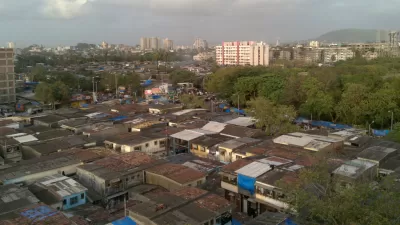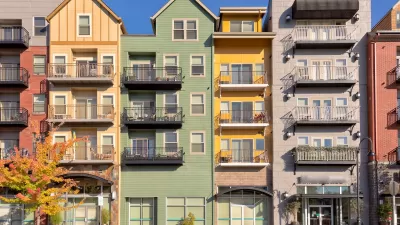Richard Florida argues that policies in cities around the world are making it harder on those most in need of housing.

When people live in slums, the way to improve their lives is to empower the people living there rather than to attack the slums themselves. Richard Florida argues that when cities try to move or destroy slums and replace them with large-scale projects, they're attacking a symptom of the housing crisis and making the root problems worse. "When residents are displaced or relocated, they are disconnected from critical social and economic networks and livelihood options they themselves created," Florida argues in CityLab.
Slums don't occur at random. When slums develop near cities, it's because the residents know they’ll have access to the economies and infrastructure resources they need.
Florida argues there are policies to help the people directly: "One way to do this is to convert underutilized urban land for affordable housing and economic development, with realistic standards for development." Another is to build infrastructure for the people who live in slums.
"The city of Medellin in Colombia famously did this by using escalators and gondolas to connect steep hillside slums to centers of jobs and economic activity," Florida writes.
FULL STORY: How Cities Are Making the Global Housing Crisis Worse

Alabama: Trump Terminates Settlements for Black Communities Harmed By Raw Sewage
Trump deemed the landmark civil rights agreement “illegal DEI and environmental justice policy.”

Study: Maui’s Plan to Convert Vacation Rentals to Long-Term Housing Could Cause Nearly $1 Billion Economic Loss
The plan would reduce visitor accommodation by 25% resulting in 1,900 jobs lost.

Planetizen Federal Action Tracker
A weekly monitor of how Trump’s orders and actions are impacting planners and planning in America.

Waymo Gets Permission to Map SF’s Market Street
If allowed to operate on the traffic-restricted street, Waymo’s autonomous taxis would have a leg up over ride-hailing competitors — and counter the city’s efforts to grow bike and pedestrian on the thoroughfare.

Parklet Symposium Highlights the Success of Shared Spaces
Parklets got a boost during the Covid-19 pandemic, when the concept was translated to outdoor dining programs that offered restaurants a lifeline during the shutdown.

Federal Homelessness Agency Places Entire Staff on Leave
The U.S. Interagency Council on Homelessness is the only federal agency dedicated to preventing and ending homelessness.
Urban Design for Planners 1: Software Tools
This six-course series explores essential urban design concepts using open source software and equips planners with the tools they need to participate fully in the urban design process.
Planning for Universal Design
Learn the tools for implementing Universal Design in planning regulations.
Caltrans
Smith Gee Studio
Institute for Housing and Urban Development Studies (IHS)
City of Grandview
Harvard GSD Executive Education
Toledo-Lucas County Plan Commissions
Salt Lake City
NYU Wagner Graduate School of Public Service




























